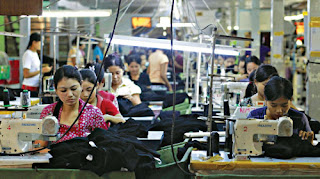Monday, 31 August 2015
Myanmar Sets Daily Minimum wage $2.80
Myanmar's government has set the daily minimum wage for workers in the country at $2.80. Industry experts are predicting this move to be a shot at recovering the garment industry that was once incredibly strong in the country.
According to the International Labor Organization, this would put Myanmar (formally called Burma) at a great competitive advantage over other countries in the region. A single worker in Myanmar would cost $67, versus $90 in Vietnam and $128 in Cambodia.
The move comes as the Untied states announced that it will be lifting the sanctions placed on the country back in 2012. The original issue stemmed from the US being concerned that many companies were tied to the generals who ran the region up until 2011. The blacklist was seen as a way to ensure the flow of money stopped.
The new law excludes family run operations and companies with less than 15 workers and is aimed primarily at the large international companies that do business in the region.
Read More at Reuters:
http://www.reuters.com/article/2015/08/29/us-myanmar-economy-wages-idUSKCN0QY0A620150829
Tuesday, 25 August 2015
Retail Stocks Showing Promise Amid Market Volitility
The Dow Jones industrial has gone a wild ride as the Chinese market has entered into a correction. The industrial average dropped 3.5% yesterday and the stock prices of major retailers like Wal-mart, target and Costco followed but to the surprise of many analysts, they bounced back slightly.
While analysts are quick to scream that the sky is falling, others are holding off to see what will happen before making any grave predictions. CNBC economist Jack Kleinhenz pointed out that it's "too soon to make any changes to the near-term outlook for U.S. economic growth and consumer spending,"
Wal-mart has already lowered their forecasts based on the increased costs of labor and slumping currency markets. It remains to be seen how other large retailers like Macy's and Target will be affected by the slide. With back to school season in full swing and the holiday's coming on quickly many are expecting most big chain stocks to feel the pinch of a contracting economy.
Yahoo Will Acquire Polyvore to Gain Foothold in Fashion Retail
Internet dinosaur Yahoo.com continues to roam the internet. This time eating up San Francisco based fashion site Polyvore for a reported 230 million dollars. Yahoo CEO Marissa Meyer has been on dealing with the unpleasant task of trying to stop the downward spiral of the company and has been making some progress. This acquisition comes as part of her plan to expand their reach across the essential product verticals.
If you're unfamiliar with Polyvore, they're site is outfit based and designed to suck you into scrolling for new styles and outfits. It's much like Pinterest, but has stronger ties to the brands that are featured. I was surprised to check Alexa and see that they're in close to breaking the top 500.
It's not entirely clear what Yahoo's strategy will be with the property. If you look at their acquisition track record they will often let a property mature before injecting too much of their own editorial on it. Tumblr is a prime example of a property that was left to be its own community, while Flickr is one of the platforms that Yahoo is mostly thought to have ruined with bureaucracy.
If you're unfamiliar with Polyvore, they're site is outfit based and designed to suck you into scrolling for new styles and outfits. It's much like Pinterest, but has stronger ties to the brands that are featured. I was surprised to check Alexa and see that they're in close to breaking the top 500.
It's not entirely clear what Yahoo's strategy will be with the property. If you look at their acquisition track record they will often let a property mature before injecting too much of their own editorial on it. Tumblr is a prime example of a property that was left to be its own community, while Flickr is one of the platforms that Yahoo is mostly thought to have ruined with bureaucracy.
Tuesday, 4 August 2015
Target Increases Pressure Online with Back to School Online Push
Sticking to their 'Expect More, Pay Less' approach to retailing, American giant Target turned up the heat on competitors this week when they announced free shipping and free returns during the back to school season.
The company vowed to further expand their omni-channel offerings back in May, and this new push shows that they're willing to make moves to secure a bigger share of the online market. As noted in this Retail Dive article, the back to school 'season' is the biggest part of the buying season aside from the holidays. It makes perfect sense that the retailer would want to try and have customers form good online buying habits before Black Friday or Cyber Monday.
Target held on to their $50 minimum purchase threshold for free shipping significantly longer than other big chains, which some observers note could be the reason that Target is now racing to make up for lost time.
Despite being a bit slow out of the gate, the company managed to grow their eCommerce business by 30% during 2014. Given that they were coming from behind established retailers like Amazon and growing powerhouse Wal-mart, it will be interesting to see if they can maintain that kind of growth year over year without causing damage to their brick and mortar traffic.
Subscribe to:
Comments (Atom)


